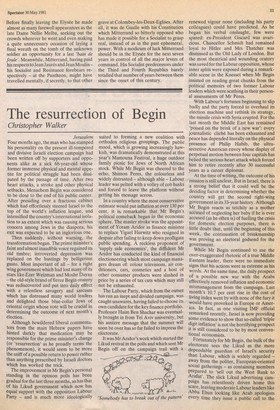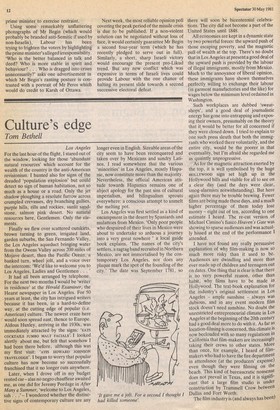The resurrection of Begin
Christopher Walker
Jerusalem Four months ago, the man who has stamped his personality on the present ill-tempered and divisive Israeli election campaign had been written off by supporters and opponents alike as a sick 68-year-old whose former immense physical and mental appetite for political struggle had been dissipated by the passage of time. After two heart attacks, a stroke and other physical setbacks, Menachem Begin was considered to be close to the end of his public career. After presiding over a fractious cabinet which had effortlessly steered Israel to the top of the world's inflation league, and intensified the country's international isolation to an extent which was causing serious concern among Jews in the diaspora, his exit was expected to be an inglorious one.
Then suddenly, Without warning, the transformation began. The prime minister's faint and almost inaudible voice regained its old timbre; introverted depression was replaced on the hustings by belligerent gusto. Most important of all — for a right wing government which had lost many of its stars like Ezer Weizman and Moshe Dayan — the old-style brand of fierce Begin oratory was rediscovered and put into daily effect with a relentless savagery and sarcasm which has distressed many world leaders and delighted those blue-collar Jews of oriental origin whose vote will be crucial in determining the outcome of next month's election.
Although bewildered liberal commentators from the main Hebrew papers have hinted darkly that medication may be responsible for the prime minister's change (or 'resurrection' as he proudly terms the phenomenon), it would seem to be more the sniff of a possible return to power rather than anything prescribed by Israeli doctors which has worked the trick.
The improvement in Mr Begin's personal standing in the opinion polls has been gradual for the last three months, as has that of his Likud government which now has equal support with the opposition Labour Party — and is much more ideologically suited to forming a new coalition with orthodox religious groupings. The public mood, which is growing increasingly hawkish, was dramatically demonstrated at this year's Mamouna Festival, a huge outdoor family picnic for Jews of North African stock. While Mr Begin was cheered to the echo, Shimon Peres, the colourless and widely distrusted — although able — Labour leader was pelted with a volley of cob husks and forced to leave the platform without getting his message across.
In a country where the most conservative estimate would put inflation at over 130 per cent, it is, remarkable that Mr Begin's political comeback began in the economic sphere. The master stroke was the appointment of Yoram Aridor as finance minister to replace Yigael Hurwitz who resigned in despair after failing to keep down profligate public spending. A reckless proponent of 'supply side economics', the diffident Mr Aridor has conducted the kind of financial electioneering which most campaign managers dream of: colour televisions, air conditioners, cars, cosmetics and a host of other consumer products were slashed in price by a series of tax cuts which may still not be exhausted.
The Labour Party, which from the outset has run an inept and divided campaign, was caught unawares, having failed to choose its own candidate for the key finance portfolio. Professor Haim Ben Shachar was eventually brought in from Tel Aviv university, but his austere message that the summer will soon be over has so far failed to impress the • electorate.
It was Mr Aridor's work which started the Likud revival in the polls and which sent Mr Begin off on the campaign trail with a renewed vigour none (including his party colleagues) could have predicted. As he began his verbal onslaught, few were spared: ex-President Giscard was avaricious, Chancellor Schmidt had remained loyal to Hitler and Mrs Thatcher was dismissed as the Old Lady of London. But the most theatrical and wounding oratory was saved for the Labour opposition, whose inner splits were exposed during a remarkable scene in the Knesset when Mr Begin insisted on reading great chunks from the political memoirs of two former Labour leaders which were scathing in their personal assessments of Mr Peres.
With Labour's fortunes beginning to slip badly and the party forced to overhaul its election machine and rethink its strategy, the missile crisis with Syria erupted. For the last month the Middle East has remained 'poised on the brink of a new war': every journalistic cliché has been exhausted and peace has depended literally on the physical presence of Philip Habib, the ultrasecretive American envoy whose display of perpetual motion between four capitals has belied the serious heart attack which forced him to retire recently after 30 successful years as a career diplomat.
At the time of writing, the outcome of his mission is still unclear. But in Israel, there is a strong belief that it could well be the deciding factor in determining whether the country will get the second right-wing government in its 33-year history. Although Mr Begin reacts as tetchily as a mother accused of neglecting her baby if he is ever accused (as he often is) of fuelling the crisis for domestic election purposes, there is little doubt that, until the beginning of this week, the continuation of brinkmanship was proving an electoral godsend for the government.
While Mr Begin continued to use the over-exaggerated rhetoric of a true Middle Eastern leader, there were no immediate signs that his actions were as extreme as his words. At the same time, the daily prospect of a possible new war with the Arabs effectively removed inflation and economic mismanagement from the campaign. Last month's 10.7 per cent rise in the cost of living index went by with none of the fury it would have provoked in Europe or America. In fact, as one visiting IMF official remarked recently, Israel is now providing some evidence to show that so-called 'triple digit inflation' is not the horrifying prospect It is still considered to be by most conventional economists.
Fortunately for Mr Begin, the bulk of the electorate sees the Likud as the more dependable guardian of Israel's security than Labour, which is widely regarded — away from the politer, European-oriented social gatherings — as containing members prepared to 'sell out the West Bank to Arafat'. The slick Likud advertising campaign has relentlessly driven home this scare, leaving moderate Labour leaders like Abba Eban looking like Arab apologists every time they issue a public call to the prime minister to exercise restraint.
Using some remarkably unflattering photographs of Mr Begin (which would probably be branded anti-Semitic if used by non-Israelis), Labour has been trying to frighten the voters by highlighting the prime minister's alleged irresponsibility. 'Who is the better balanced in talk and deed? Who is more stable in spirit and behaviour? . . Who is dragged into crises unnecessarily?' asks one advertisement in which Mr Begin's ranting posture is contrasted with a portrait of Mr Peres which would do credit to Karsh of Ottawa. Next week, the most reliable opinion poll covering the peak period of the missile crisis is due to be published. If A non-violent solution can be negotiated without loss of face, it would certainly guarantee Mr Begin a second four-year term (which he has recently pledged to serve out in full). Similarly, a short, sharp Israeli victory would encourage the present pro-Likud trend. But any new conflict which was expensive in terms of Israeli lives could provide Labour with the one chance of halting its present slide towards a second successive electoral defeat.











































 Previous page
Previous page